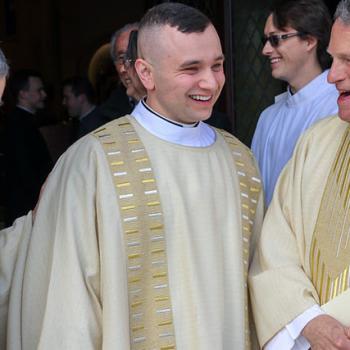At Patheos' Preachers Portal, we would like to assemble "Monday Sermons," sermons that might be of interest to pastors who are typically preaching their own sermons on Sundays. These Monday sermons, we thought, should be rich and challenging, willing to deal with the profound questions of faith, and yet also educational in a way that equips and inspires for the sermon to come in the week ahead.
Reverend Dr. Daniel Harrell preached until recently at Boston's famed Park Street Church and is now Senior Minister at The Colonial Church in Edina, Minnesota. His series preaching through the Church Fathers struck us as an excellent way to offer a sermon for pastors, a model of theological education from the pulpit, and a way to keep that seminary education fresh!
Below is his introduction to the series - Church Fathers ABCs -- and the first installment.
Introduction
For fourteen years I have preached an annual sermon series on the Church Fathers, those personalities who over the early centuries of church history fashioned our faith and codified that which we have come to embrace as orthodox Christianity. As there have been numerous noteworthy Church Fathers (and Mothers) it seemed sensible to tackle them a letter at a time.
My rationale for taking an annual peek at these people comes from my own conviction that our faith derives in no small part from the faithful personalities who've lived it and wrestled with it through crucial moments in church history. While we Protestants may not venerate these important people as saints, we cannot separate their contributions from our own doctrines and practice. We may hold to sola Scriptura (the Bible alone as source of authority), but interpreting and obeying the Bible necessarily stands on the interpretive and obedient shoulders of past believers and thinkers. Tradition is the memory of the church. And as Augustine argued, we are who we are only through our memories.
Patristic scholars will rightly note that I have exceedingly stretched the notion of "church father" beyond its proper boundaries. Technically, to be a Church Father, you had to live in the first five centuries A.D. But seeing this is a blog for Protestants (which means that our grasp of church history generally reaches back only as far as C.S. Lewis and Karl Barth), I tend to dispense with such technicalities. Enjoy.
Daniel M. Harrell, PhD
Minneapolis, Minnesota
Church Fathers Starting with the Letter A: Athanasius
Ever had something awful occur in your life just to have someone come along and say something like: "It's probably for the best" or, "something good will come out of this"? Makes you want to punch them. A college classmate of mine died years ago and his father recalled how at the hospital some folks from church came to offer comfort by encouraging him to try and find some good in his son's death. This father later wrote that he wished these friends would have simply cried with him. The truth is that life can just pretty much suck sometimes and attempts to forage for something good from those times amounts to little more than stage one denial. Yet in such times the oft-quoted passage from the book of Romans does come to mind: "We know that in all things God works for the good of those who love Him" (8:28). Is this true?
Athanasius definitely thought so. The Bible is clear that God is good. Working from the biblical premise and borrowing logic from Plato, Athanasius concluded that God being essentially good as well as the source of all goodness would never be envious regarding anyone. He would not deny anyone their best. God being good, Athanasius wrote, cannot "be miserly, selfish or ungenerous regarding anything nor begrudging of anyone their existence but rather would wish everyone to live." This conclusion, that a good God begrudges no one life, served as the crux of Athanasius's contention not merely that God can do you good, but that He can do nothing else.
Athanasius was born in Alexandria, Egypt around 293. The story goes that as a boy he was swimming in this river along with some of his friends when, mimicking what he'd seen done in church, Athanasius started dunking his friends under water in the name of the Father, Son, and the Holy Spirit. A bishop happened by and upon observing the baptismal frolic grew alarmed that young Athanasius may perchance have been using the Lord's name in vain. Calling him over, the bishop was prepared to scold him severely. However, upon examination he discovered Athanasius to be quite the precocious young lad and thoroughly orthodox. The baptisms were pronounced legitimate. Athanasius's swimming buddies must have been stunned to discover that their playful submersion had actually served as their religious consecration.
The bishop promptly whisked Athanasius off to parochial school where his preparations for the priesthood began in earnest. Athanasius grew to become one of the giants of the church primarily due to his work in defining and defending the doctrine of the Trinity over against the heresies of the 4th century. Ordained a deacon upon completion of his studies, he went to work as secretary to the bishop of Alexandria. It was from this office that he dove into the thick theological fray that culminated in the Council of Nicea in 325. At Nicea, Athanasius opposed Arius, an Alexandrian priest who advanced the doctrine known as Arianism. Arianism reduced the divinity of Christ by deducing that God could not share His divine nature with anyone else since to do so would have meant an impossible division of His person. Accordingly, Jesus Christ was a "sub-deity," the highest of all creatures, but still just that, a creature, subordinate to God the Father. Jehovah's Witnesses still hold this position. Opposing this heresy, Athanasius formulated the homoousian doctrine, still maintained, which declares that the Son of God is of the same divine substance as God the Father.





